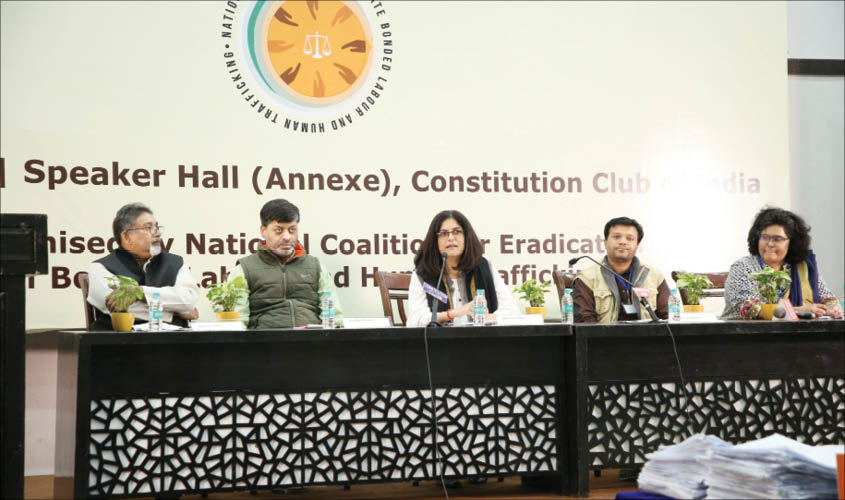Recently, the National Coalition to Eradicate Bonded Labour and Human Trafficking (NCEBLHT) organised a national multi-stakeholder consultation on “Bonded Labour and Human Trafficking” at the Constitution Club of India in Delhi.
The event was attended by senior officials from the Ministry of Labour and Employment MoLE, the National Human Rights Council (NHRC) and members of the Civil Society and media.
The National Coalition to Eradicate Bonded Labour and Human Trafficking (NCEBLHT) has collected over 12,000 signatures of survivors of human trafficking urging the government and all political parties to the pass the Trafficking of Persons Bill 2018 in the Winter Session of Parliament.
Survivors of human trafficking and bonded labour from 14 states, including Uttar Pradesh, Bihar, Odisha, Punjab, Madhya Pradesh, Rajasthan, Tamil Nadu, Karnataka, Maharashtra and West Bengal have contributed to the signature campaign.
At the event, rescued bonded labourers and survivors of human trafficking recounted their stories which described their persecution and ordeal from the days of their bondage to how they were rescued and rehabilitated.
Dr. K Krishnan of the Foundation for Sustainable Development (FSD) , who is a co-convener of the coalition, said : “The Trafficking of Persons Bill makes the rehabilitation of survivors a basic right, provides a time-bound procedure for rescue, repatriation and rehabilitation. The Bill makes government accountable to implement the law at district, state and national level. To support enactment of the law, over 12,000 survivors from 14 states have written to Prime Minister Narendra Modi so that human trafficking is addressed in a comprehensive manner”.
The signatures were presented at the National Consultation on Bonded Labour and Human Trafficking on 13 December at the Constitution Club of India, New Delhi. The event was also called to evolve a framework and strategy of stakeholders for a collaborative effort to tackle the menace of human trafficking and bonded labour.
The coalition members have been working on the issue of bonded labour and human trafficking along with the government over the past few years. The members of the coalition have also supported the government in rescuing more than 30,000 survivors from various industries across the country.
In the last few years the Government has taken various initiatives and measures to eradicate the problem of human trafficking and bonded labour in the country including initiatives like establishing Anti-Human Trafficking Units (AHTUs), reporting Human Trafficking cases under the National Crime Records Bureau, the notification of the Central Sector Scheme for Rehabilitation of Bonded Labourer 2016 (CSS BLR), the Standard Operating Procedure for Identification and Rescue of Bonded Labour.
Speaking further on the issue, Lenin Raghuvanshi, founder, People’s Vigilance Committee on Human Rights (PVCHR) said: We can talk about awareness to end bonded labour but we also have to diagnose the problem well.
The fight against bonded labour is fight that must involve the police, magistrates, CSOs and also address systematic structures of exploitation based on caste and patriarchy. This coalition is an attempt to amplify the voice of survivors towards creating more visibility to the issue of human trafficking and bonded labour.
The Trafficking of Persons (Prevention, Protection and Rehabilitation) Bill, 2018 seeks to make India a leader among South Asian countries in combating the menace of human trafficking. However, in addition to appeals for allocation of adequate resources for its enforcement, civil society organisations have been pushing for time-bound procedures for the rescues and safeguards for the non-liability of trafficking victims under the new law. There is need also for trained and designated officials with the authority to take up labour trafficking cases. Civil society is also pressing for protocols and funds for the coordination of inter-State cases to strengthen the network of officials, survivors and NGOs.

